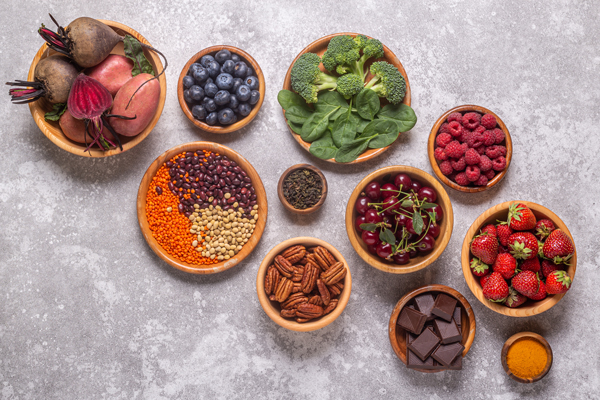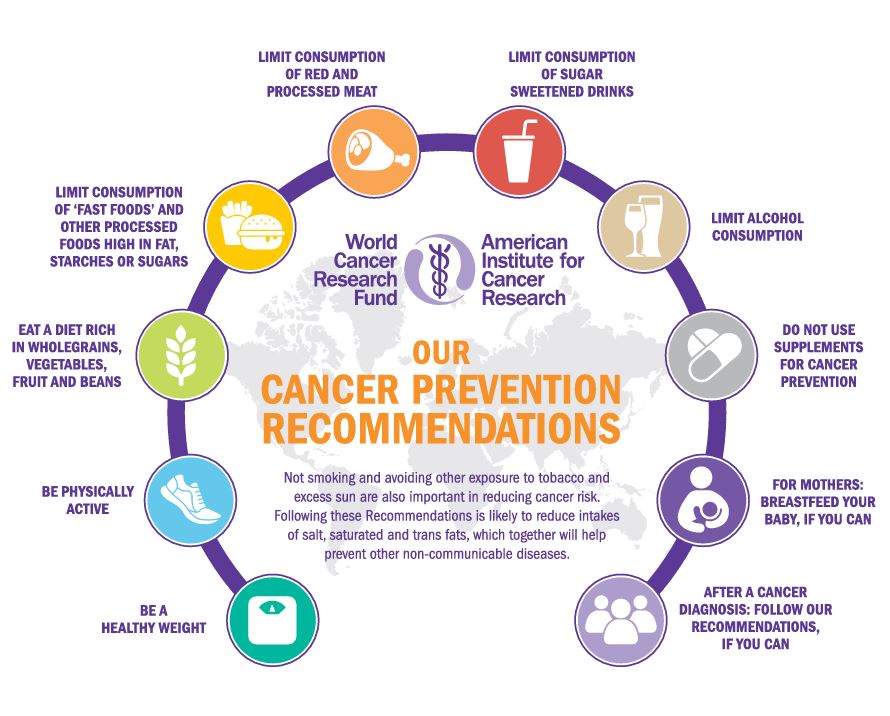It is well accepted science that anti-oxidant rich foods are an important part of a healthy diet. Yet many questions around antioxidants remain in research, such as their role in chronic disease prevention and in longevity. But what are antioxidants, and how can they improve health?
What are antioxidants?
Dietary antioxidants are health and longevity promoting. They can be essential vitamins and minerals such as Vitamin C, Vitamin E, Vitamin A, and selenium and manganese. They can also be non-essential micronutrients such as polyphenols. Some antioxidants are made within the body as well. It is estimated that there are thousands of types of antioxidants in foods.
The Institute of Medicine defines a dietary antioxidant as “a substance in foods that significantly decreases the adverse effects of reactive species, such as reactive oxygen and nitrogen species, on normal physiological function in humans”. Oxidative stress is involved in the development and progression of non-communicable disease such as cancer, Type 2 diabetes, and cardiovascular disease.
In other words, antioxidants prevent oxidative reactions, for example by scavenging reactive oxygen species. Reactive oxygen species can come from normal metabolic activities within the body, or from external sources such as X-rays, ozone, cigarettes smoking, air pollutants and industrial chemicals. These reactive oxygen molecules can damage lipids, proteins, and DNA. Without going too deep into the organic chemistry, it is important to know that a balance between free radicals and antioxidants is necessary to prevent oxidative stress, which can help prevent chronic disease.
Antioxidants and cancer prevention
There are many different types of cancer, yet all arise as a result of some form of DNA damage which leads to abnormal cell behaviour, and ultimately unregulated cell division. Epidemiological studies show that a high intake of anti-oxidant-rich foods is inversely related to cancer risk. One mechanism by which antioxidants are thought to reduce risk of cancer is by preventing formation of the free radicals that cause DNA damage. Some antioxidants may also participate in other biological reactions that regulate enzymes or proteins involved in cancer prevention.
One specific food (technically beverage) example in cancer research is green tea, which has an exceptionally high amount of an antioxidant type called catechins. It is believed that catechins, both through their antioxidant ability as well as other biological interactions, may help prevent certain types of cancer. However, more research is needed.
While antioxidants are thought to be particularly important in cancer prevention, their proposed longevity benefits extend to the prevention of most non-communicable chronic diseases.
Where do we find antioxidants in foods?
All plant-based foods have antioxidants. Therefore, eating more plant-based, focusing on vegetables, fruits, nuts, seeds, and legumes are all excellent ways to increase antioxidants in the diet. Don’t forget about the extras too, as some teas and virtually all spices and herbs are great sources of antioxidants. Below are some specific examples of antioxidants and where you can find in the diet:
Vitamin C, also known as ascorbic acid, is found in a variety of fruits and vegetables. Some great sources include: citrus (oranges, lemons, limes, grapefruit, kiwi), bell peppers, sugar snap peas, tomatoes, strawberries, potatoes, and cruciferous vegetables.
Vitamin E, also known as tocopherols, is found in plant-based oils, nuts, seeds, fruits and vegetables. Great food sources include: Vegetable oils (Ex. Wheat germ, sunflower, safflower, soybean), almonds, peanuts, dark leafy greens, pumpkin, red bell pepper, asparagus, mango, avocado.
Vitamin A, also known as carotenoids, are found in vegetables, fruits, and eggs. Great food sources include leafy green vegetables, tomatoes, red bell pepper, cantaloupe, mango, fish oils, milk, eggs, and some fortified foods. Interestingly there are specific carotenoids that are not converted to vitamin A, but have specialized health promoting antioxidant properties, and include lycopene, lutein, and zeaxanthin.
Polyphenols are micronutrients that naturally occur in plants. There are more than 8000 types of polyphenols, including resveratrol in wine, capsaicinoids in chili peppers, and flavonoids in fruits and teas. Great food sources include a variety of fruits, vegetables, teas, and spices.
Spices in particular are well known for their anti-oxidant and anti-inflammatory properties. Turmeric is a well-researched example that many people take as a dietary supplement nowadays. But liberal use of a variety of spices is a great way to increase your intake of antioxidants, and decrease inflammation. Many cuisines, such as Mexican, Indian, and Mediterranean cuisines all use spices liberally, and many are also used in traditional medicine systems.
Are some antioxidants better than others?
There used to be a test called ORAC (Oxygen Radical Absorption Capacity) that was used by the USDA to rate antioxidant capacity of foods. This test and associated food database were controversial due to it’s misuse by supplement manufacturing companies to promote their products. Additionally, since these tests are performed in experimental conditions outside the body, the translatability to human health was also controversial. The database has thus been retracted. However, some experts feel that the information is valuable if used appropriately.
For example, spices have comparatively high ORAC scores compared to most other food groups when compared by weight. In my opinion, evidence through antioxidant tests such as ORAC, anti-oxidant and anti-inflammatory properties found in many spices, and a low risk profile are convincing enough arguments in my professional opinion to use spices more liberally.
One of my favourite spices lately is Sumac, which has an exceptionally high ORAC score. It is actually made from a dried berry, has a slightly bitter, yet delicate lemon citrus flavour, and is excellent on fish, vegetables, and in dips and spreads.
Doubling up spices in online recipes, trying more ethnic cuisines, or simply making a point of using a new spice or herb with a vegetable are all simple ways to increase your use of spices in the diet. Plus, if you have high blood pressure, using more spices is a great strategy to reduce sodium without sacrificing flavour!
Hopefully more rigorous tests for assessing antioxidant capacity in foods will emerge in the future. Until then, developing a dietary strategy that promotes variety of diverse food groups, colourful vegetables and fruits, liberal use of spices and herbs are all excellent strategies that can increase the amounts and types of antioxidants in your diet.
Should you supplement with antioxidants?
Expert consensus points to a food-based approach to increase your consumption of dietary antioxidants.
Let’s put it this way – the average human diet has approximately 25,000 bioactive food constituents, including essential nutrients and non-essential nutrients, and the aforementioned thousands of antioxidants molecules in foods.
Choosing only specific supplements is costly, and may detract from a more holistic approach of increasing variety in diet, which is ultimately the best way to ensure you get the most optimal health benefits from food.
That said, and just like most topics in nutritional science, rarely is there a one-size-fits all approach. The science is always emerging, and often the correct approach involves a weighing of pros and cons of the most rigorous and up to date evidence. A varied, plant forward diet will be your best approach to optimize your nutrition, both through antioxidants and other health promoting nutrients. But it could be that certain supplements may benefit certain individuals.
If you have questions about dietary supplements, please speak with your doctor or dietitian.
Looking for ways to increase antioxidants in your diet?
Book an appointment or contact me here dietitian to learn more about antioxidants, and how to incorporate them more in your diet to help prevent disease and optimize your health
Dan Neuman
Registered Dietitian MSc


